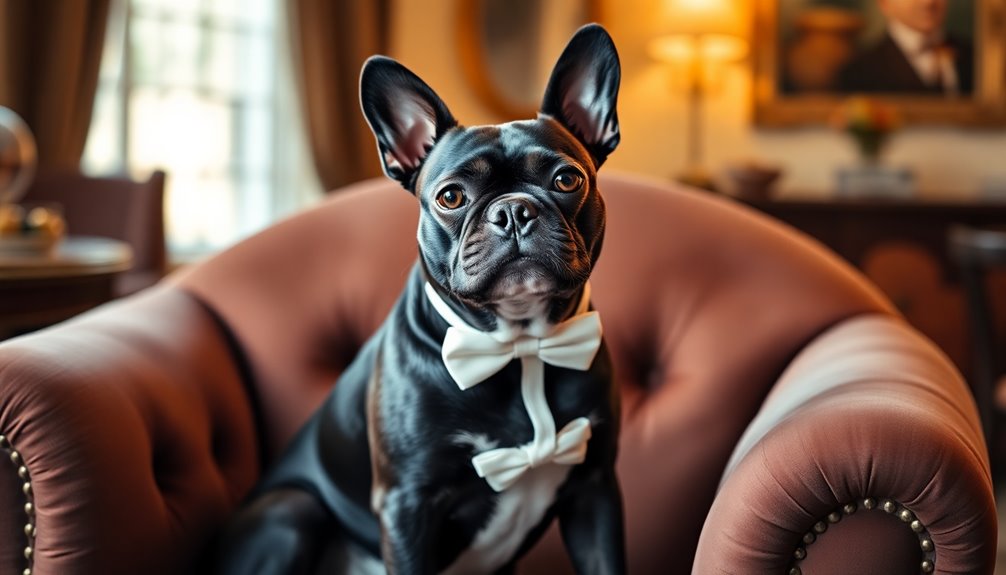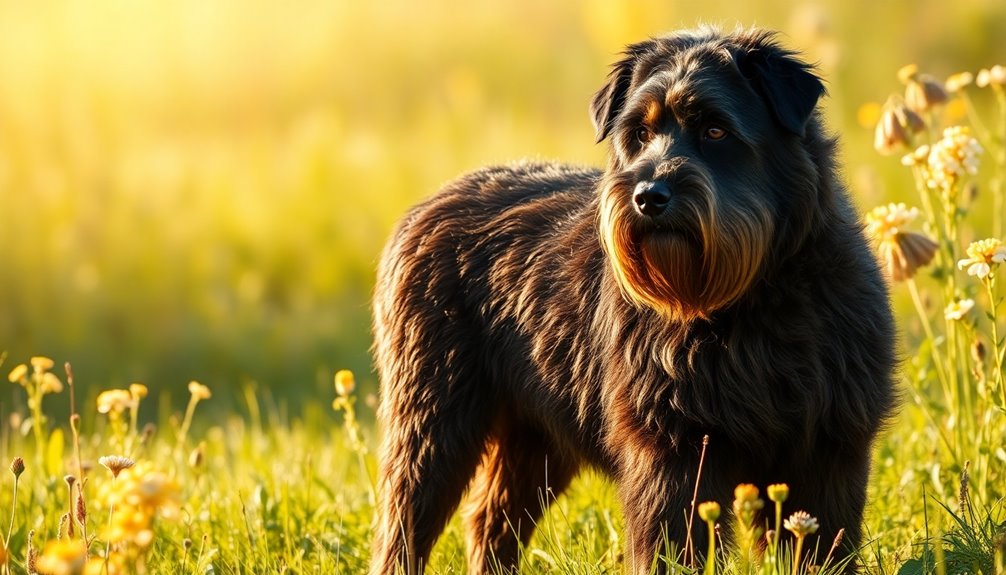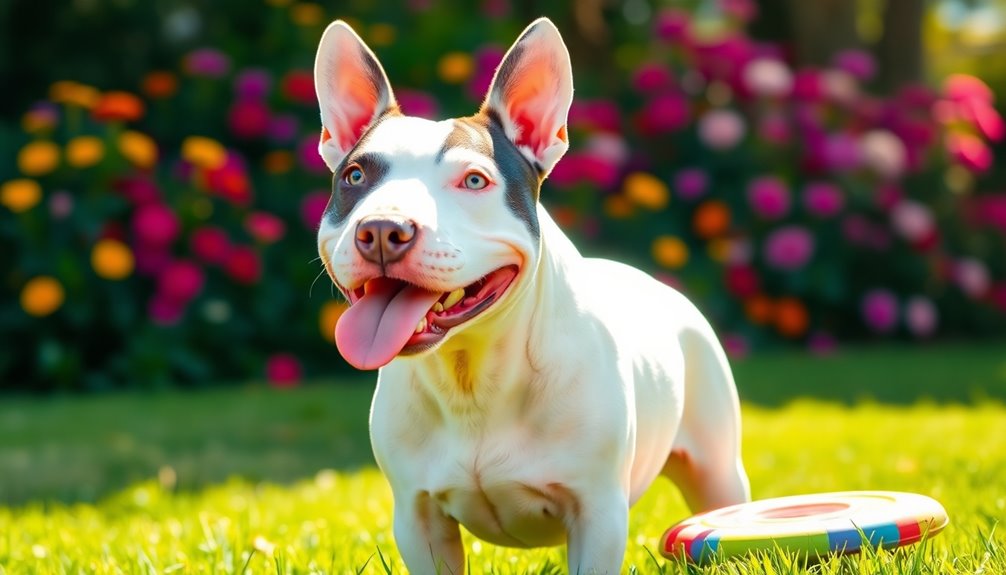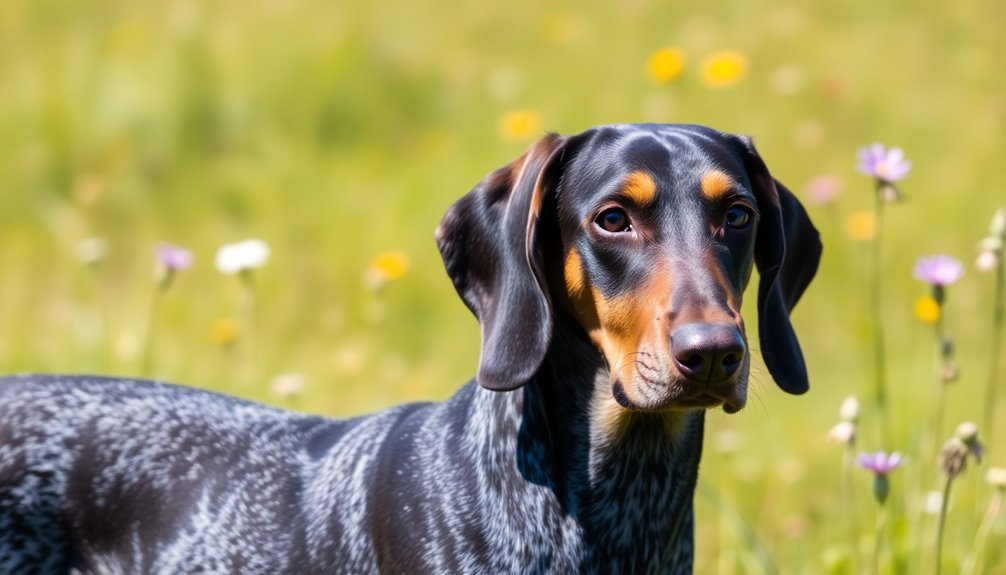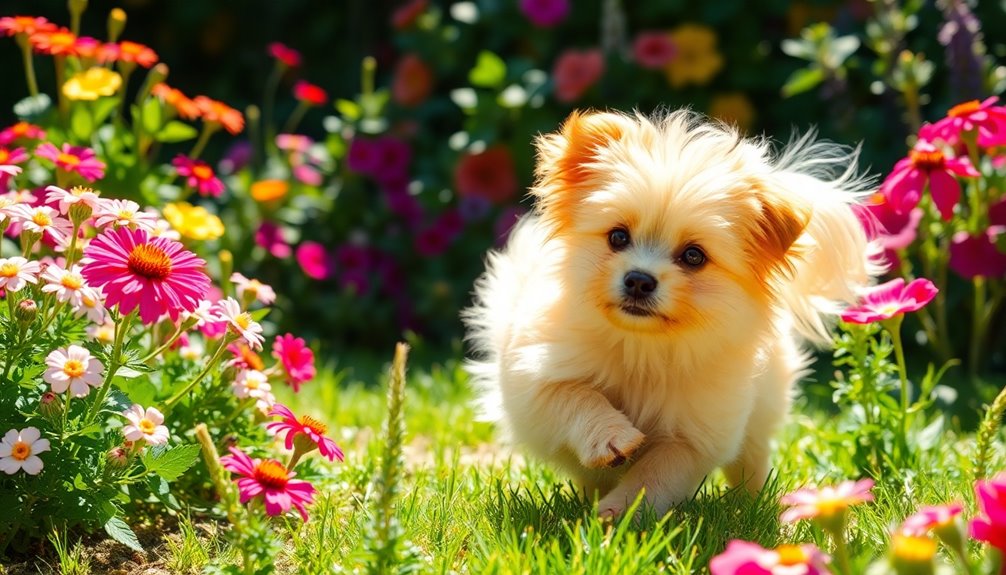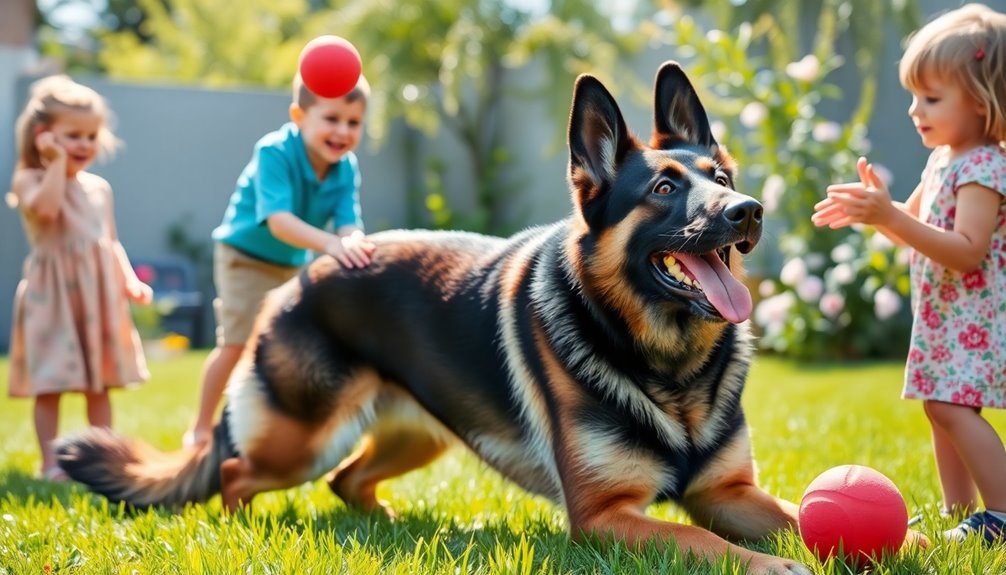Boston Terriers, often called "The American Gentleman," are small, lovable dogs with a distinctive square build and friendly personality. Standing 12-17 inches tall, they're perfect for families and individuals alike. Their playful nature means they thrive on social interaction and enjoy exercise, needing about an hour of activity daily. With a brachycephalic structure, they require a cool, well-ventilated environment to stay comfortable. Although they face some health issues, like breathing difficulties, a balanced diet and regular vet visits can help maintain their health. Discover the unique history and care tips for these charming companions as you explore further.
Key Takeaways
- Boston Terriers are known as the "American Gentleman" for their tuxedo-like coat and charming demeanor.
- They originated in the late 19th century from a mix of English Bulldog and White English Terrier breeds.
- Their friendly, playful nature makes them excellent family pets, well-suited for children and other animals.
- Boston Terriers require regular exercise, approximately 1 hour daily, to maintain their energy levels and health.
- Brachycephalic traits make them prone to respiratory issues, necessitating a cool, well-ventilated living environment.
Introduction
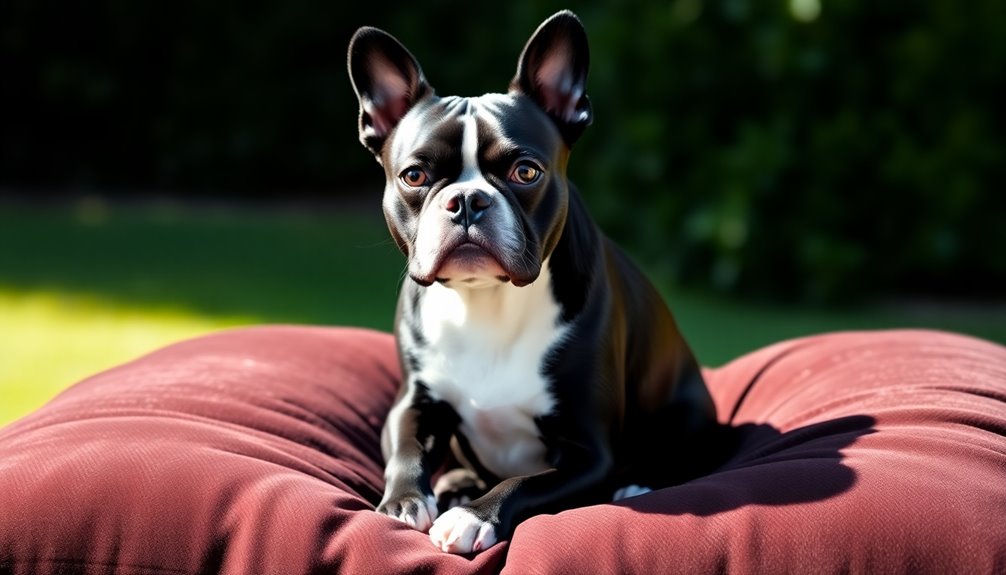
Boston Terriers are a delightful breed, known for their compact size and charming personality. They typically stand between 12 to 17 inches tall and weigh under 25 pounds, making them perfect companions for city living.
Their square appearance, with a well-muscled body and broad chest, gives them a distinctive look. You'll notice their large, round, dark eyes and square-shaped head, which adds to their adorable charm.
These dogs have erect ears, whether cropped or natural, and a short tail that can be straight or screw-shaped. Their friendly and affectionate temperament makes them great family pets, and they generally get along well with people, including kids and strangers.
However, their strong-willed nature can lead to stubbornness, so early socialization is crucial. Additionally, they have a high-energy level, requiring approximately 1 hour of daily exercise to keep them happy and healthy.
As a brachycephalic breed, Boston Terriers may face some health issues related to their flat faces. Regular check-ups and care are essential to ensure their well-being.
With minimal grooming needs and a quiet demeanor, they're well-suited for apartment living, making them a popular choice for many dog lovers.
History and Origin
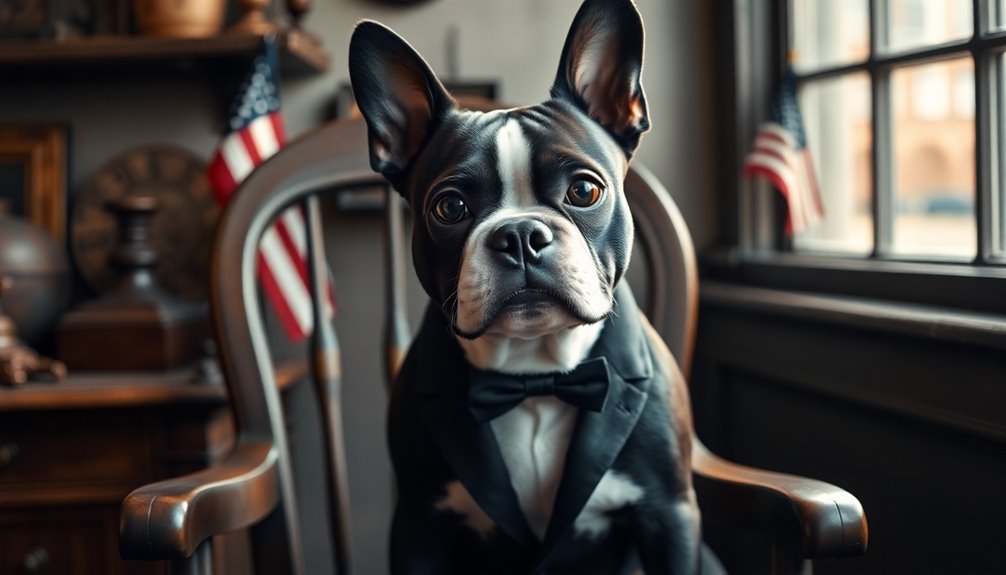
The Boston Terrier originated in the late 19th century in Boston, Massachusetts, and quickly gained popularity. Initially bred for fighting, these dogs transformed into beloved family pets known for their friendly nature. You'll find that their evolution into companion animals highlights their charm and intelligence, making them a favorite in many households today. This transformation was largely influenced by the breed's recognition as a companion dog with a tuxedo-like appearance, earning them the nickname "American Gentleman."
Where and when the breed originated
Originating in the late 19th century, the Boston Terrier has its roots in Boston, Massachusetts, where early breeders began developing this distinctive breed. The breed emerged from a cross between an English Bulldog and a White English Terrier, possibly a Bull Terrier. Key figures in the breed's development were Robert C. Hooper and Joseph Burnett, who resided in Southborough, Massachusetts.
In 1865, Hooper purchased a foundational dog named Hooper's Judge from William O'Brien. He later bred Judge with Burnett's Gyp, producing noteworthy offspring like Well's Eph. The late 1860s saw the initial breeding efforts take shape, and by the 1870s, significant studs like Barnard's Tom and Atkinson's Toby played vital roles in solidifying the breed type.
In 1888, the New England Kennel Club recognized the breed as the Round Head Bull and Terrier. It then underwent a name evolution, officially becoming the Boston Terrier in 1891, thanks to the establishment of the Boston Terrier Club of America. The breed's initial name was proposed as "roundhead" before its final designation.
The American Kennel Club (AKC) later recognized the breed as a non-sporting breed in 1893, cementing its status in American canine history.
Companion and Family Pet
With their friendly disposition and playful nature, Boston Terriers have become cherished companions and family pets since their inception in the late 19th century.
These dogs are known for their sociable personalities, making them excellent choices for families. They thrive on affection and love to cuddle, always wanting to be near you. Their playful energy adapts well to various lifestyles, so whether you're in a bustling city apartment or a quiet suburban home, they fit right in. Their high energy levels ensure that they remain active and engaged, contributing to a lively household.
Boston Terriers are particularly great with children, displaying a gentle attitude that makes them fantastic family pets. They usually get along well with other pets, provided they receive proper socialization from a young age.
You'll find that they respond quickly to positive reinforcement training, showcasing their intelligence.
Health-wise, they're generally resilient but can face some breed-specific issues. Regular vet check-ups and a watchful eye on their well-being will help ensure a long, happy life, typically ranging from 11 to 15 years.
With minimal grooming needs and a moderate exercise level, they require comfortable environments and mental stimulation to thrive, making them perfect companions for any family dynamic.
Physical Characteristics

When you look at Boston Terriers, you'll notice their compact size and muscular build, typically ranging from 9 to 15 inches in height and weighing between 6 to 25 pounds. Their short, square muzzles give them a distinctive appearance, while their smooth coat comes in various striking colors. This breed is known for its tuxedo-like coat, which contributes to its nickname, the "American Gentleman." This combination of features not only makes them adorable but also highlights some important aspects of their care and health.
Size, weight, and coat details
Boston Terriers are compact little dogs, typically standing between 12 to 17 inches tall at the shoulders. Males usually reach around 17 inches, while females stand about 16 inches. Their weight varies across three classes: lightweight (under 15 pounds), middleweight (15-20 pounds), and heavyweight (20-25 pounds). Males generally weigh between 15 and 25 pounds, whereas females average between 13 and 20 pounds. Breeders prioritize preservation of weight classes when producing Boston Terriers to maintain their distinctive size.
During their first year, they experience significant weight growth, stabilizing by 12 to 14 months, with adult weights averaging around 19.84 pounds at 8 months and 23.14 pounds by 12-14 months.
The Boston Terrier's coat is short, smooth, and fine, requiring minimal grooming. You'll notice their lustrous texture, with common colors including brindle with white, black with white, and seal with white. Ideal markings feature a white muzzle, an even white blaze over the head, and white on the collar, breast, and legs.
These dogs have a sturdy, square-shaped build with a muscular physique, large round eyes that express curiosity, and upright ears that add to their charming appearance. Overall, their physical characteristics make them a delightful companion.
Short, Square Muzzle
The Boston Terrier's distinctive short, square muzzle adds to its unique charm and character. Historically, these dogs had a more defined muzzle, but breed standards have evolved. Today, the American Kennel Club (AKC) describes the muzzle as short, square, wide, and deep—complementing the skull's proportions. Ideally, the muzzle shouldn't exceed one-third of the skull's length, ensuring balance in appearance.
This characteristic contributes to the breed's brachycephalic features, leading to health concerns such as Brachycephalic Obstructive Airway Syndrome (BOAS). The muzzle's structure can cause narrowed nasal passages and elongated soft palates, making breathing difficult. Additionally, short muzzles can compromise the dog's cooling system, increasing the risk of overheating.
You might also notice that the broad jaw allows for an even or slightly undershot bite, with potential dental issues like malocclusion.
Additionally, the short muzzle can result in other anatomical challenges, including a higher risk of eye diseases due to the flat skull shape and potential skin fold dermatitis from the skin around the muzzle.
While this charming feature enhances the Boston Terrier's appeal, it's essential to be aware of the associated health implications that come with their adorable appearance.
Temperament and Personality
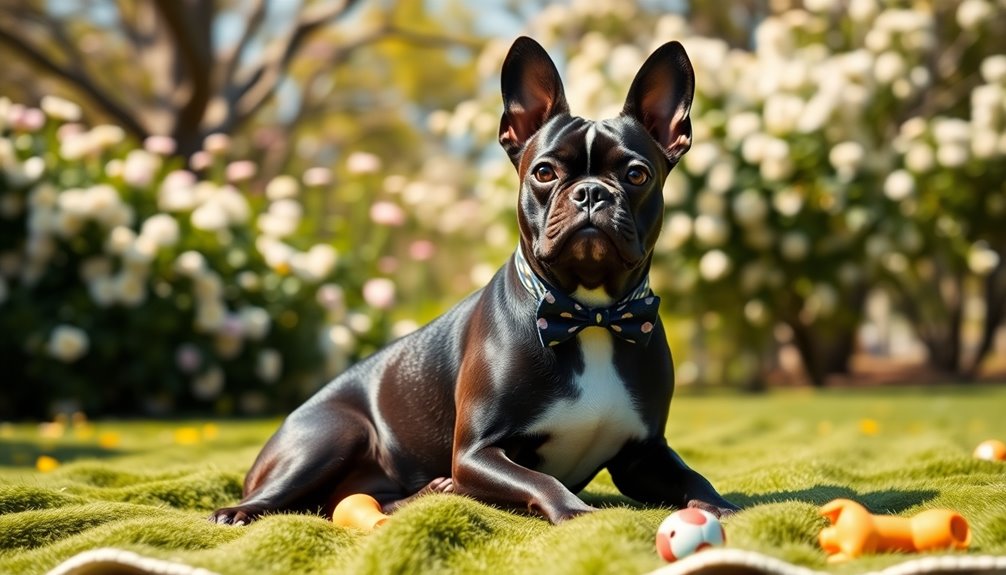
Boston Terriers are known for their playful and social demeanor, making them wonderful companions for both families and individuals. They thrive on interaction and enjoy being part of the family, often getting along well with other pets too. With their high energy levels, they require regular exercise and playtime to keep them happy and healthy. If you're looking for a dog that brings joy and energy into your home, a Boston Terrier could be the perfect fit.
Playful and Social Demeanor
With their playful and social demeanor, Boston Terriers offer endless joy to their families. These energetic companions bring fun into your life, thriving on activities like flyball and agility. Their high playfulness means you'll always have an enthusiastic partner for games, but they also know when to settle down, adapting well to different environments.
Boston Terriers are incredibly social, forming strong bonds with you and other family members. Their friendly nature helps them win over strangers and fellow pets alike, especially when properly socialized. Engaging with various people and dogs boosts their confidence and enriches their lives. Additionally, their affectionate personalities ensure they are always ready to provide comfort and companionship.
Intelligent and eager to please, Boston Terriers respond well to positive reinforcement training. While they might show some stubbornness, consistent and patient guidance helps them learn quickly. Their affectionate personalities make them the center of attention, ensuring they keep you entertained with their comical antics.
However, be mindful of their emotional needs; they can experience separation anxiety if left alone for too long. To keep your Boston happy, provide mental stimulation and ample attention, ensuring their playful and social spirit thrives.
Suitability for families, individuals, or other pets
For families, individuals, and even other pets, Boston Terriers shine as adaptable companions thanks to their friendly, affectionate, and intelligent nature. They make excellent family dogs when properly trained and socialized, generally getting along well with children and other pets. Just remember to supervise interactions with kids to ensure everyone stays safe and happy.
These little pups can form harmonious relationships with cats and other dogs, but slow and controlled introductions are key. They can also coexist with small mammals like rabbits and guinea pigs, though supervision is necessary. Birds and reptiles can be part of the mix too, but always exercise caution, as each dog's behavior can vary. Boston Terriers typically exhibit a low prey drive, making them generally compatible with small mammals like rabbits and guinea pigs.
Boston Terriers thrive on human companionship, making them suitable for the elderly and individuals with disabilities. Their small size allows them to adapt well to urban living, but they do need regular playtime and short walks to stay happy and healthy.
Keep in mind that they can suffer from separation anxiety if left alone for long hours, so gradually introducing them to solo time is crucial for their well-being. With the right training and socialization, you'll have a loving, loyal companion.
Health and Lifespan
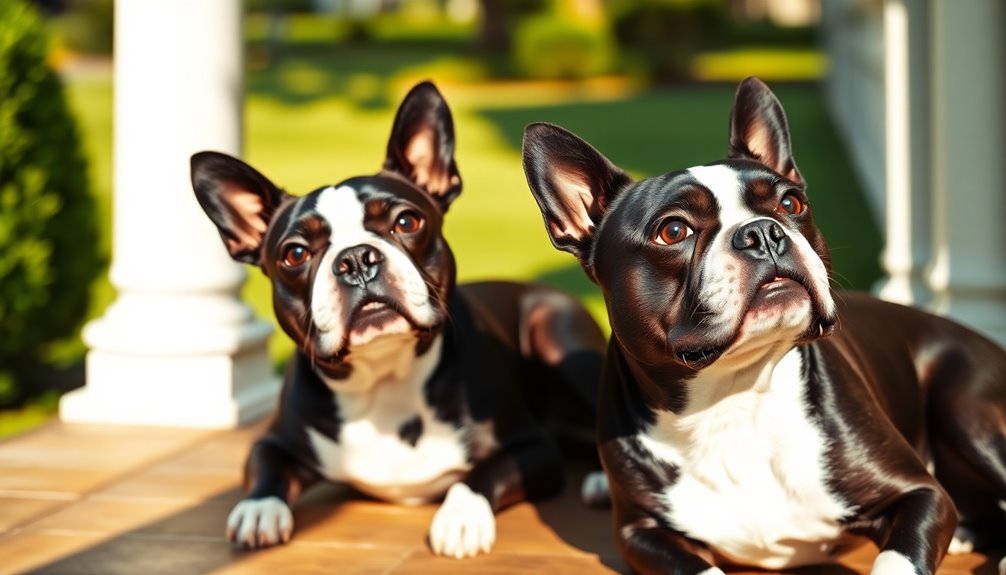
Boston Terriers typically live between 11 to 15 years, but with proper care, some can even reach 18. You'll want to be aware of common health issues like breathing difficulties and eye problems that can affect their quality of life. Maintaining a healthy lifestyle can significantly impact their overall lifespan.
Typical lifespan of the breed
The typical lifespan of a Boston Terrier ranges from 11 to 15 years, but with proper care, many can live beyond that, even reaching up to 18 years in exceptional cases. Several factors influence how long your Boston will be by your side. Genetics play a significant role, so adopting from a responsible breeder can give your pup a healthier start.
To help your Boston thrive, provide a well-balanced diet tailored to their specific needs. Regular exercise is crucial, so make sure to engage them in daily walks and playtime. In fact, 30 to 60 minutes of daily exercise will significantly support their cardiovascular health and help mitigate heart disease risks. Routine veterinary check-ups and preventive care will also contribute to their longevity.
Creating a safe and comfortable environment is essential for their well-being. Avoid overfeeding, as obesity can lead to health issues. Keep their minds stimulated with activities like fetch and tug-of-war.
Don't forget about grooming—regular brushing and bathing maintain their coat, while ear checks can prevent infections.
Lastly, remember to prioritize dental care, as regular teeth brushing and dental chews help prevent dental issues. By focusing on these areas, you can help ensure your Boston Terrier lives a long, happy life.
Common health concerns or genetic predispositions
When considering a Boston Terrier's health, it's essential to be aware of common genetic predispositions and health concerns that can impact their quality of life. This breed is prone to several inherited disorders, including atopy, which leads to skin allergies, and hereditary cataracts that can affect their vision.
You may also encounter cleft lip or palate, corneal dystrophy, and even deafness due to genetic factors. Structurally, Boston Terriers often face issues like hemivertebra, which can cause spinal cord compression, and patellar luxation, where the kneecap dislocates easily. Other concerns include spina bifida and hip dysplasia, though the latter is less common.
Being brachycephalic, these dogs are susceptible to respiratory problems, including Brachycephalic Obstructive Airway Syndrome (BOAS) and laryngeal collapse, which can lead to severe breathing difficulties. Additionally, you should watch out for Cushing's Disease, glaucoma, and keratoconjunctivitis sicca, all of which can severely affect their overall health. Significant conditions recognized by veterinary practitioners can help guide owners in monitoring their pets. Staying informed about these potential issues can help you provide the best care for your Boston Terrier.
Tips for maintaining health and wellness
How can you ensure your Boston Terrier lives a long, healthy life? Start by providing a balanced, high-quality diet rich in protein. Look for dog food that lists real meat, like turkey or fish, as its first ingredient. Always consult your vet to determine the right food and portion sizes, and avoid overfeeding to prevent obesity.
Daily exercise is essential, so aim for 30-60 minutes of activity each day. Break this into 2-3 shorter walks to prevent overheating. Engage in brisk walks and playtime, using soft toys to protect their mouths. Regular vet check-ups are vital as they can aid in early detection of potential health issues.
Regular grooming is crucial, too. Brush their coat frequently to keep it healthy and spot any skin issues early. Clean their ears weekly with dog-specific products and maintain dental hygiene by brushing their teeth and providing dental chews.
Don't forget routine vet check-ups—at least once a year for adults, and twice for puppies or seniors. Monitor their weight and tailor a health plan to watch for potential issues.
A safe, stimulating home environment and early detection of health concerns can significantly contribute to your Boston Terrier's longevity and well-being.
Care Requirements

When it comes to caring for your Boston Terrier, you'll find that they require minimal brushing due to their short coat, but regular exercise is essential to keep their energy levels in check. You'll want to aim for about an hour of activity each day to prevent boredom and maintain their health. Additionally, focusing on a balanced diet will help ensure your pup stays happy and healthy. Regular grooming, including ear cleaning, is also important for maintaining their overall health.
Minimal Brushing Required
Although Boston Terriers have a short coat that requires minimal brushing, regular grooming is still important for their overall health. You should aim to brush your Boston once a week, using a wire dog brush or a pin brush with metal pins. This helps remove dead hair and prevents matting, keeping their coat shiny and healthy.
Remember to brush in the same direction as the fur, starting from the body and moving upward or using a circular motion for the undercoat. Regular bathing is also essential but can be done every week to every six weeks, depending on how dirty your dog gets. Always use a gentle, pet-friendly shampoo to maintain their coat's natural oils, steering clear of human shampoos that can irritate their sensitive skin.
Before bathing, consider using a high-velocity dryer to loosen dirt and dander.
Don't forget to trim their nails regularly, clean their ears to prevent infections, and check their facial wrinkles daily.
Daily eye checks are crucial too, as is maintaining dental hygiene through regular brushing and dental chews.
With these simple grooming habits, your Boston Terrier will look and feel their best!
Exercise requirements and energy levels
Grooming isn't the only aspect of keeping your Boston Terrier healthy; regular exercise is just as important. These energetic little dogs need around an hour of exercise each day, which you can break into two walks. Aim for 30 to 60 minutes daily to keep them fit and prevent boredom-related behavior issues. Daily walks not only provide physical activity but also offer mental stimulation.
Walking is ideal, and you should consider 2-3 shorter walks each day. Playing fetch in the yard is another fun option to help burn off energy. You might also try swimming, but always supervise closely, as Boston Terriers can struggle in water. Agility courses and interactive play sessions, like tug-of-war, can challenge them both physically and mentally. Additionally, these dogs are high-energy breeds that thrive on consistent activity and engagement.
Keep in mind that exercise needs vary by age. Puppies require shorter, more frequent play sessions, while older dogs may prefer gentler activities. Always monitor for signs of overheating or fatigue, especially in hot weather.
Ensure your dog has a brachycephalic-friendly harness for comfort. Regular vet check-ups are essential for managing any potential health concerns.
Feeding tips and diet recommendations
A balanced diet is crucial for keeping your Boston Terrier healthy and energetic. To support their growth, puppies need about 25% protein, while adults should have around 18%. Focus on high-quality animal-based protein sources like chicken, beef, and fish, which are essential for lean muscle and overall health.
When it comes to fat content, aim for 12-15% for puppies and 8% for adults. Keep it relatively low to reduce obesity risk, but include Omega-3 and Omega-6 fatty acids for brain function and a shiny coat. Quality animal fats also boost immunity and heart health.
For carbohydrates, stick to about 9% for adults. Use complex carbs like sweet potatoes and brown rice for sustained energy and natural fiber. Limit simple carbohydrates to prevent weight gain, and ensure a fiber content of 4-5% for digestive health. This is particularly important as Boston Terriers have a tendency to gain weight if not monitored closely.
Feeding schedules matter, too. Puppies should eat four times a day until three months, then three times. Adults typically need one to two cups daily, split into two meals.
Monitor portions to maintain a healthy weight, adjusting based on activity and regular weigh-ins.
Training and Socialization
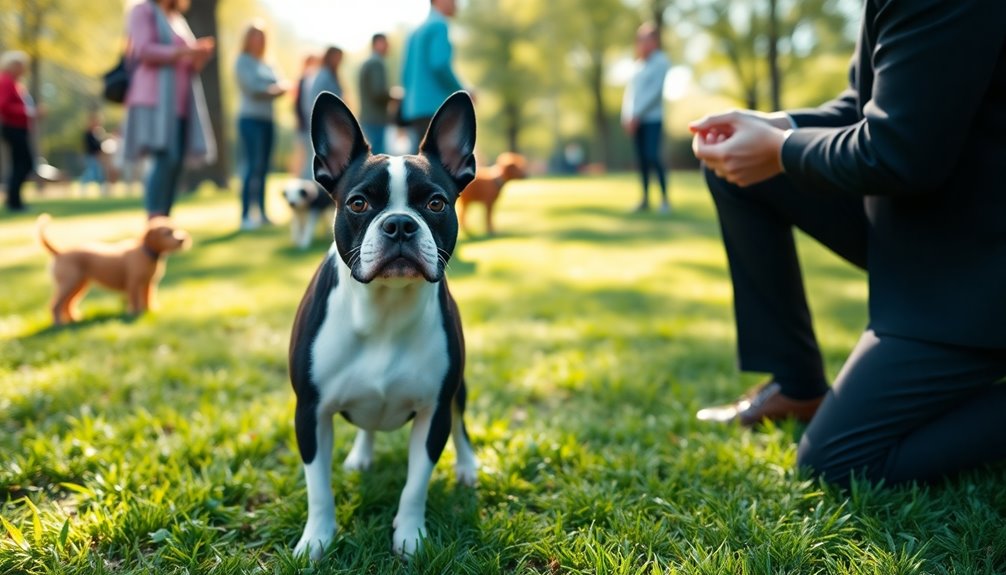
When training your Boston Terrier, you'll find they're moderately responsive to commands, so stay consistent and patient. Gradual introductions to new environments will help them adapt and build confidence. Additionally, starting training early can lead to better long-term results as they are more receptive to learning at a young age. Be aware of their tendency to pull on the leash, and use positive reinforcement to guide them into better habits.
Moderately Responsive to Commands
Boston Terriers are moderately responsive to commands, making effective training and socialization essential for their development. To get the best results, focus on positive reinforcement; they thrive on praise, treats, and rewards. Consistency is key, so use the same commands every time to avoid confusion.
Keep training sessions short—about 5 to 15 minutes—to maintain their focus and enthusiasm. Incorporate fun elements to keep your Boston engaged, and practice drills to help make commands routine. Additionally, implementing counterconditioning techniques can significantly improve their response to external stimuli during training.
Socialization plays a crucial role in their adaptability, so introduce your dog to new people, situations, and other pets early on. They're known for getting along well with breeds like Labrador Retrievers and Beagles, which can enhance their social skills.
Be aware of their emotional sensitivity; they pick up on your energy, so stay positive. With their intelligence and desire to please, Boston Terriers can learn quickly, but you might need to break activities into smaller steps and practice each one.
When undesirable behavior arises, ignore it instead of scolding. This way, you'll create a consistent training environment, helping your Boston Terrier become a well-mannered companion.
Gradual Introductions to New Environments
Introducing your Boston Terrier to new environments should be a thoughtful and gradual process. Start socializing your puppy between 3 to 14 weeks of age, as this is a critical time for learning. Begin with short visits to familiar settings, like different rooms in your home, before progressing to outdoor areas.
Gradually increase the complexity of the environments as your pup gains confidence. Use positive reinforcement to reward calm behavior during these new experiences. Treats, praise, and toys will help create positive associations with unfamiliar places.
Keep socialization sessions short and enjoyable, ensuring that your puppy feels secure. Expose your Boston Terrier to diverse environments and interactions. Take them to parks, pet stores, and friends' homes, and introduce them to various people, including children and those wearing hats or uniforms. Proper exposure to different environments fosters adaptability and builds confidence, reducing anxiety with other dogs and people.
Arrange playdates with other well-behaved dogs, and let your puppy explore different surfaces like grass and concrete. Familiarize them with common household noises and everyday objects to prevent startling.
Leash Pulling Tendencies
Leash pulling often frustrates many dog owners, especially during walks. This behavior can stem from a lack of exercise and mental stimulation, training mistakes, or simply the dog's desire to explore. If you're using a short leash or interrupting your Boston Terrier's sniffing, you might inadvertently encourage pulling. It's essential to establish consistent training to combat this issue.
Start training indoors to minimize distractions, so your dog learns that pressure on the leash means they should come to you. Use positive reinforcement, rewarding them with treats and praise for walking beside you. Designate a specific side for your dog to walk on to build a habit. Frequent practice sessions can significantly improve your dog's ability to learn loose leash walking. Additionally, incorporating a bedtime routine can help your dog feel more secure and focused during training sessions.
If they pull, stop walking and wait for a loose leash before proceeding. Consider using front-hook harnesses or head halters for dogs prone to pulling. Make sure your leash isn't too short and keep it in a J-shape to indicate a loose leash.
Remember to be consistent with the no-pulling rule, even in distracting situations. Practice often but keep sessions short and fun, ending on a positive note to reinforce good behavior.
Ideal Living Environment
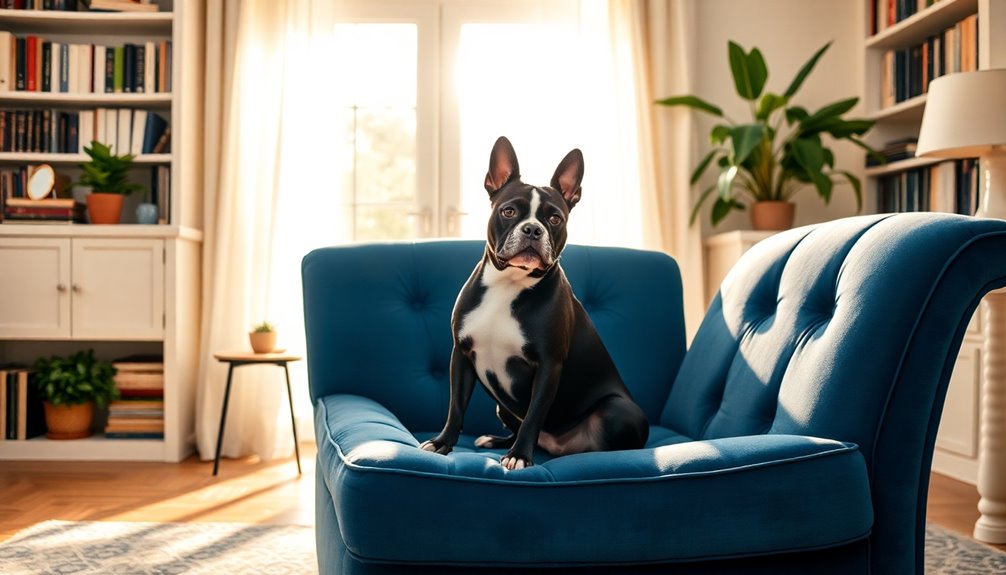
If you live in an apartment, Boston Terriers can be a perfect fit, especially if there are nearby parks for their outdoor playtime. Just keep in mind that they can be sensitive to heat, so providing a cool environment during humid months is essential. Creating a comfortable living space will ensure your pup thrives and stays happy. Additionally, these dogs thrive in indoor living, making them well-suited for apartment life.
Apartment With Nearby Parks
Living in an apartment with nearby parks creates an ideal environment for Boston Terriers, as it meets their exercise and socialization needs while accommodating their moderate energy levels. Weighing between 10-25 pounds, these small breeds thrive in small to medium-sized spaces. They don't require extensive exercise, so a few short walks around the block each day suffice to keep them happy and healthy. Additionally, aquatic exercise can be a great way to complement their physical activities, especially during warmer months.
Within your apartment, Boston Terriers can engage in their quirky "Zoomies," dashing around to burn off energy. Their intelligence and trainability make it easy to manage apartment life, and their minimal barking ensures harmonious living with neighbors. Additionally, their lower exercise requirements mean that they can still enjoy playtime in the apartment without needing constant outdoor exercise.
Having parks nearby amplifies their well-being. Daily visits provide opportunities for physical activity and mental stimulation, allowing your pup to socialize and explore new environments. You can enjoy playtime, fetch, or short-distance runs together, which helps them stay fit and content.
With their short, smooth coats and low grooming needs, Boston Terriers are perfect companions for apartment living. By choosing a home near parks, you're giving your furry friend the best chance to thrive in a vibrant, stimulating environment.
Heat Sensitivity in Humid Climates
Heat sensitivity is a significant concern for Boston Terriers, especially in humid climates. Their brachycephalic anatomy, characterized by a short muzzle, makes it hard for them to cool off effectively through panting. With small nasal openings and a long soft palate, airflow is limited, increasing their risk for heat-related issues.
To keep your Boston Terrier safe, ensure they live in cool, well-ventilated spaces. Indoor living is best during extreme temperatures, and you should provide shaded areas for outdoor time. Always have fresh water available, and plan outdoor activities for cooler parts of the day, like morning or evening. The optimal outdoor temperature range for these dogs is around 45°F – 85°F (7°C – 29°C), so be mindful of temperature fluctuations.
Avoid strenuous exercise during peak heat, and keep walks short to prevent overheating. Never leave your Boston Terrier in a parked car, as this can lead to rapid overheating. Watch for signs of heat exhaustion, such as excessive panting or foaming at the mouth.
Using pet-safe sunscreen on exposed skin can help, and providing cooling mats or fans can aid in reducing their body temperature. Always seek veterinary care if you notice concerning symptoms, as early intervention is key to their health and safety.
Boston Terriers Are Hypoallergenic
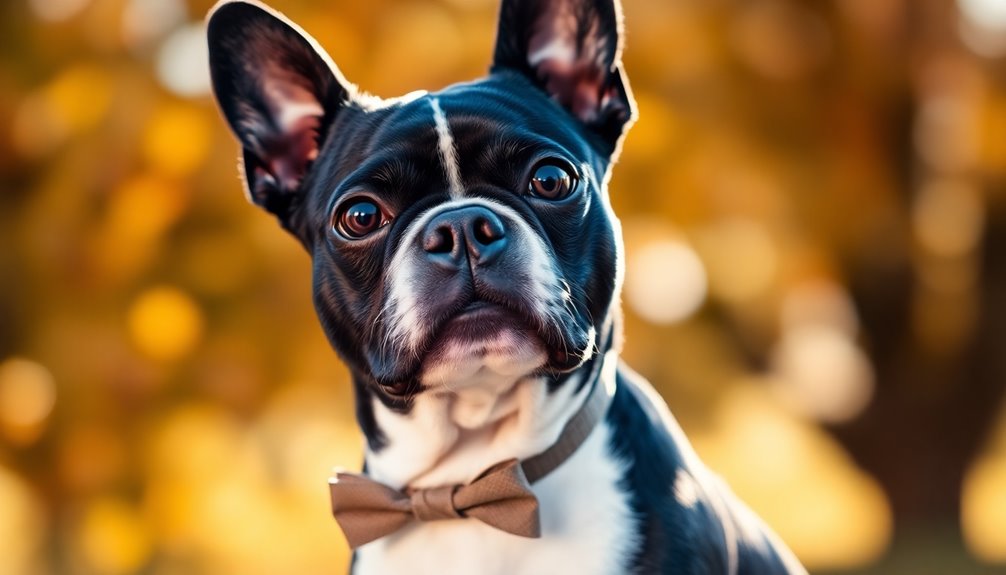
While many people might think Boston Terriers are hypoallergenic due to their short coats, that's not quite the case.
These charming dogs still produce dander and other allergens that can trigger reactions in sensitive individuals. With their distinctive "tuxedo" coat pattern and celebrity status, it's essential to understand their grooming needs to manage allergens effectively. Regular grooming not only helps to minimize allergens but also promotes the health of their coat through proper skin oil distribution.
Distinctive "Tuxedo" Coat Pattern
Boston Terriers stand out not just for their charming personalities but also for their distinctive "tuxedo" coat pattern. The most iconic color combination is black and white, where a predominantly black coat features crisp white markings on the chest, muzzle, neck, and between the eyes. This tuxedo-like appearance gives them a distinguished look that's both practical and appealing, as the dark color helps hide dirt.
To keep that coat looking its best, regular grooming is essential. You should brush your Boston Terrier weekly with a soft-bristle brush or rubber grooming mitt to distribute natural oils and maintain shine. During shedding seasons, increase brushing to 2-3 times a week. A damp cloth can also help catch loose hairs. Additionally, maintaining their coat health can prevent issues related to skin challenges that arise from rare color variations.
Proper grooming not only enhances their appearance but also prevents skin issues like excessive scratching and irritations. Pay attention to eye care to avoid tear stains and clean their ears weekly to prevent infections.
Don't forget to trim their nails every 2-3 weeks. With these care tips, you'll keep your Boston's distinctive coat healthy and stunning.
Pet of Choice for Celebrities
Celebrities are often drawn to Boston Terriers, captivated by their charming personalities and compact size. These adorable dogs, often weighing between 12 to 25 pounds, fit perfectly into busy lifestyles and urban living spaces. High-profile owners like Adam Sandler with his pup Matzoball and Reese Witherspoon with Pepper showcase how these dogs can be part of a glamorous lifestyle while remaining loving companions.
Boston Terriers aren't just cute; they're intelligent and easy to train, making them ideal pets for anyone, including busy celebrities. Their friendly and affectionate nature ensures they're great family pets, always ready to join you on walks or cozy up on the couch. Additionally, their moderate energy levels mean they enjoy playtime but can also relax when needed.
However, it's essential to remember that they're not hypoallergenic. While they do shed, regular grooming can help manage dander and allergens around your home.
Celebrities like John Legend and Chrissy Teigen with Pippa, and Ashley Tisdale with Maui, highlight the appeal of these dogs. Their expressive faces and unique tuxedo markings only add to their charm.
Ultimately, Boston Terriers make excellent companions, blending seamlessly into the lives of those who adore them.
Ideal for Small Living Spaces

If you're living in a small space, a Boston Terrier could be the perfect companion for you.
Their moderate exercise needs mean you won't have to worry about extensive outdoor time, and their playful nature keeps them entertained indoors. Additionally, their strong bonds with owners make them even more devoted companions, ensuring you never feel alone.
Plus, their friendly temperament makes them great for first-time dog owners who appreciate a loving, adaptable pet.
Great for First-Time Owners
For first-time dog owners seeking a companion that fits seamlessly into small living spaces, Boston Terriers are an excellent choice. Their affectionate and intelligent nature makes them a joy to have around. They form strong bonds with their families, thriving on human companionship.
This breed is gentle and patient, making them a great fit for families, including those with members who've disabilities. Boston Terriers adapt well to various living environments, including city apartments. They don't need much space; a cozy bed, some toys, and a designated eating area will suffice. With regular exercise and mental stimulation, they can be perfectly content in smaller homes or apartments, even without a yard.
Training is relatively easy with Boston Terriers, as they respond well to positive reinforcement methods. Early socialization is crucial for helping them develop into well-mannered adults. Additionally, they generally have a moderate energy level, which allows them to enjoy playtime without overwhelming their owners.
They enjoy being the center of attention and can bring endless entertainment to your home with their playful antics. Just keep in mind that they can experience separation anxiety if left alone for too long, so they're best suited for owners who can spend quality time with them.
Exercise Needs and Energy Levels
Boston Terriers thrive on regular exercise and mental stimulation, making them perfect companions for those living in small spaces. You'll want to provide them with around an hour of exercise each day, ideally split into two walks. These dogs are high-energy, so consistent activity is crucial to prevent any destructive behaviors. Additionally, they are a popular choice for small space living due to their adaptability.
Taking them to a secure environment for off-lead running is great for letting them stretch their legs. They love physical activities like walking, fetch, and tug-of-war, which also help keep their minds engaged. Even with their moderate energy needs, they require regular playtime with you to stay healthy and happy.
Boston Terriers adapt well to apartment living, needing only a comfortable bed and a few toys to thrive. While they don't require a lot of space, they do need a designated area for eating and resting.
If you have a puppy, keep in mind their unique exercise needs; shorter play sessions are best until they're fully grown. Overall, with a bit of daily effort, your Boston Terrier will be a content and energetic companion in your small living space.
Frequently Asked Questions
What Is the Typical Price Range for a Boston Terrier?
When you're looking to buy a Boston Terrier, expect to pay between $900 and $2,500.
The average cost hovers around $1,300, but factors like the breeder's reputation, the puppy's pedigree, and coat color can significantly influence the price.
If you're considering show-quality pups or champion bloodlines, be prepared for higher prices, possibly reaching up to $4,000.
Always research breeders to ensure you're making a well-informed decision.
How Often Should Boston Terriers Be Groomed?
You should groom your Boston Terrier every 4 to 6 weeks for a full grooming session.
Weekly brushing helps remove loose hair and distribute natural oils, keeping their coat shiny.
Bathing them monthly or when they get dirty is also important, using a dog-specific shampoo to protect their sensitive skin.
Don't forget to check their nails and facial folds regularly to ensure overall health and comfort.
Consistent grooming makes a big difference!
Do Boston Terriers Have Any Common Behavioral Issues?
Yes, Boston Terriers can have common behavioral issues.
You might notice separation anxiety, leading to destructive behaviors when left alone. They can also be vocal, barking excessively due to boredom or anxiety.
Aggression might surface, especially if they haven't been properly socialized. Jumping on people and stealing food can also occur.
Consistent training, mental stimulation, and socialization can help address these issues and ensure a well-adjusted companion.
What Are the Best Toys for Boston Terriers?
When choosing toys for your Boston Terrier, consider their chewing habits and playful nature.
Puzzle toys like the Nina Ottosson Hide 'n' Slide stimulate their minds, while durable chew toys like Nylabone Dura Chew satisfy their strong urge to chew.
For outdoor fun, opt for Chuckit Ultra Balls that float and are easy to spot.
Engage their instincts with multi-part squeaky toys that provide interactive play.
These options will keep your pup entertained and happy!
Can Boston Terriers Be Left Alone for Long Periods?
Yes, Boston Terriers can be left alone for moderate periods, usually up to 4-5 hours for healthy adults.
However, it's important to prepare them properly. Start with short absences and gradually increase the time. Use positive reinforcement to reward calm behavior, and establish a routine.
To manage potential separation anxiety, provide toys, background noise, and ensure they're well-exercised before you leave.
Each dog's needs may vary, so pay attention to their behavior.
Conclusion
In conclusion, Boston Terriers truly embody the charm of the American gentleman. Their friendly nature, compact size, and adaptability make them perfect companions for various lifestyles. With the right training and socialization, you'll find these little dogs bring joy and affection to your home. Plus, their hypoallergenic qualities make them suitable for allergy sufferers. If you're looking for a loving, lively pet that fits well in small spaces, a Boston Terrier could be your ideal match!

